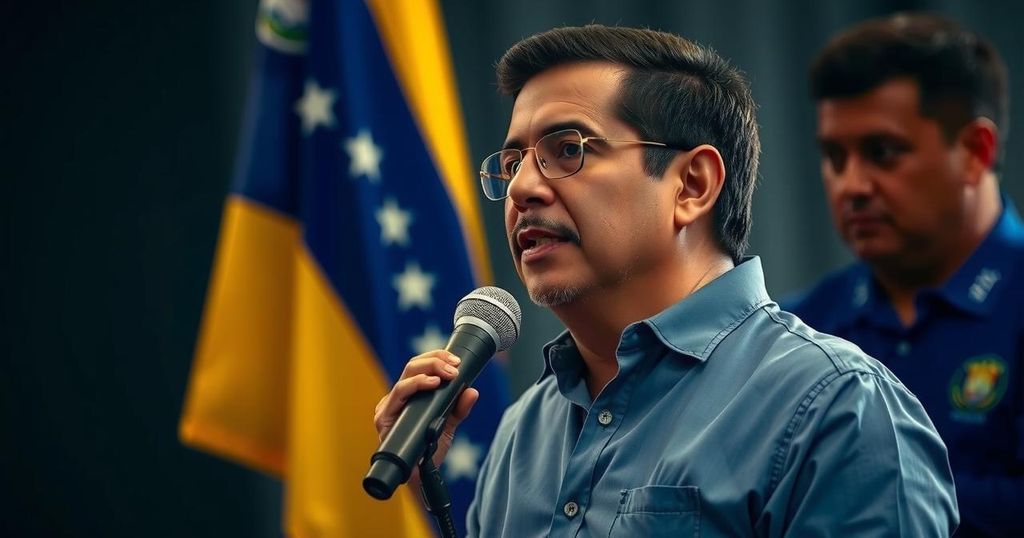Politics
ANTONY BLINKEN, AP, BLINKEN, BRAZIL, COUNCIL, CUBA, DEMOCRACY, ELECTION, EUROPEAN UNION, GIL, GONZÁLEZ, GOVERNMENT, NATIONAL ELECTORAL COUNCIL, NICOLÁS MADURO, NORTH AMERICA, POLITICS, PRESIDENTIAL ELECTION 2024, PRESIDENTIAL ELECTIONS, SOUTH AMERICA, U. S, US, VENEZUELA
Isaac Bennett
0 Comments
U.S. Recognizes Edmundo González as Venezuela’s President-Elect Amid Election Disputes
The U.S. has recognized Edmundo González as Venezuela’s president-elect months after a disputed election won by Nicolás Maduro. U.S. Secretary of State Antony Blinken highlighted demands for respect towards Venezuelan voters’ will. The National Electoral Council declared Maduro the winner, facing challenges from opposition claims of fraudulent results. González commended the U.S. recognition, and Colombia’s president reversed his earlier support for the elections, calling them a mistake.
In a significant political development, the United States has officially recognized Venezuelan opposition candidate Edmundo González as the “president-elect” of Venezuela, as announced by U.S. Secretary of State Antony Blinken. This recognition comes months after President Nicolás Maduro claimed victory in the contentious election held on July 28. The U.S. administration asserts that González received the most votes, yet has refrained from fully acknowledging him as the legitimate president, a claim contested by Maduro’s government, which is backed by a National Electoral Council perceived to be partisan. Following this announcement, González expressed gratitude on social media, stating, “We deeply appreciate the recognition of the sovereign will of all Venezuelans… This gesture honors the desire for change of our people.” Nevertheless, he has faced significant challenges, including a warrant for his arrest due to his role in publishing vote counts that contradict the official results. Meanwhile, Maduro’s administration has continuously dismissed international calls for clarity regarding the election results, which many observers, including U.N. experts, have characterized as lacking credibility. On the political front, Colombian President Gustavo Petro recently retracted his earlier endorsement of the elections, declaring that they were a “mistake.” This statement underscores the shifting political landscape and rising criticisms of Maduro’s regime from regional leaders who once supported his administration. With Venezuela’s presidential term set to commence on January 10, Maduro has already been invited to participate in the swearing-in ceremony by the ruling party-controlled National Assembly. The actual legitimacy of the July elections continues to be a matter of contention, with both internal and external stakeholders pressing for a more transparent acknowledgment of the electoral processes. The U.S. recognition of González may represent an attempt to legitimize the ongoing calls for political reform in Venezuela while reinforcing the U.S. stance against the Maduro government amid a backdrop of international scrutiny.
The political climate in Venezuela has been marked by deep divisions and allegations of electoral fraud, particularly surrounding the July 2023 presidential election in which Nicolás Maduro was declared the winner. The U.S. government and numerous international observers have raised concerns regarding the integrity of the electoral process, with claims that the election was neither free nor fair. Edmundo González, the opposition candidate, has become a symbol of the struggle for democratic reform in the country as he seeks recognition for what many believe to be his rightful electoral victory. The geopolitical implications of these events extend beyond Venezuela, prompting reactions from neighboring countries and impacting international diplomatic relations.
The United States’ recent recognition of Edmundo González as Venezuela’s president-elect marks a pivotal moment in the ongoing political struggle within the country. This recognition serves to amplify the international response to the allegations of electoral fraud and the call for democratic reforms. With Maduro’s government facing growing criticism both domestically and from international leaders, the political future of Venezuela remains uncertain as calls for transparency and legitimacy press forward.
Original Source: apnews.com




Post Comment